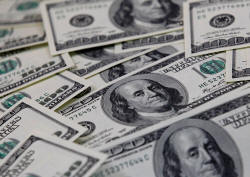Analysis-A digital dollar is years away as U.S. Fed kicks issue to
Congress
 Send a link to a friend
Send a link to a friend
 [January 24, 2022] By
Pete Schroeder [January 24, 2022] By
Pete Schroeder
WASHINGTON (Reuters) - While the Federal
Reserve's paper on potentially adopting a central bank digital currency
(CBDC) will advance debate in Washington, its decision to kick the issue
to Congress means an official U.S. digital dollar is still several years
away.
The U.S. central bank on Thursday released a much-anticipated paper on
the pros and cons of adopting a digital dollar, a digital version of
cash in your pocket, in which it refused to take a stance and said
Congress should decide the matter.
Many CBDC enthusiasts saw the report as a key milestone in developing
some form of digital dollar policy, but with lawmakers confused and
divided on the issue -- even within their own parties -- analysts said
they should not hold their breath.
"The paper ... is light on conclusions and reinforces our view that a
Fed-backed CBDC is -- at best -- years away from launch," Isaac
Boltansky, director of policy research for brokerage BTIG, wrote in a
note. "We are bearish on a legislative solution emerging."

Unlike cryptocurrencies, which are run by private actors, a CBDC would
be issued and backed by the central bank. It would differ from
electronic transactions that happen through large commercial banks by
giving consumers a direct claim to the central bank, similar to physical
cash.
A digital dollar could transform the financial system, speeding up
payments globally and giving consumers greater access to the financial
system, the Fed said. But it cautioned that a poorly designed digital
dollar could weaken banks, destabilize the financial system and create
privacy issues.
About 90 countries
https://www.atlanticcouncil.org/
cbdctracker, including China, are exploring or launching their own CBDCs,
according to the Atlantic Council, sparking concern among some that the
United States will cede the dominance of the global financial system if
it does not digitize the dollar, currently the global reserve currency.
In an already fiercely divided political climate, reaching a consensus
on this tangle of thorny issues "seems like a long shot," JPMorgan chief
economist Michael Feroli wrote in a note.
[to top of second column] |

U.S. one hundred dollar notes are seen in this picture illustration
taken in Seoul February 7, 2011. REUTERS/Lee Jae-Won (SOUTH KOREA -
Tags: BUSINESS)/File Photo

While some Republicans are eager for the Fed to embrace innovative technology,
others have expressed concern over the central bank expanding its footprint and
competing with private banks.
"I'm genuinely undecided whether there is a legitimate need for a CBDC,"
Republican U.S. Senator Cynthia Lummis, a leading digital currency proponent,
tweeted following the Fed's report.
Some Democratic progressives like Senate Banking Committee Chairman Sherrod
Brown support a digital dollar that would boost financial inclusion, but other
Democrats have flagged concerns that a digital dollar could be used for illicit
purposes.
Brown, who would play a leading role in drawing up legislation in the thinly
divided Senate, said on Thursday that the report was a "a good first step,"
while some other lawmakers said they were looking forward to working on
legislation.
But even if Congress was able to agree on and pass legislation this year, the
rollout of a digital dollar would require a lengthy pilot and implementation
phase.
"Even if you start today, we're still going to be a couple of years away from
this becoming a reality," said Jonathan McCollum, chair of federal government
relations for Davidoff Hutcher & Citron, who has lobbied lawmakers to get
started.
As lawmakers, regulators and the White House debate the issue, the private
sector is likely to move ahead with products that may weaken the argument for a
digital dollar, Ian Katz, managing director of Capital Alpha Partners, said in a
note.
"If it finally happens years down the road, a Fed CBDC would be less of a
world-changer than it would be now," he added.
(Reporting by Pete Schroeder; editing by Michelle Price and Jonathan Oatis)
[© 2022 Thomson Reuters. All rights
reserved.]This material may not be published,
broadcast, rewritten or redistributed.
Thompson Reuters is solely responsible for this content.
 |